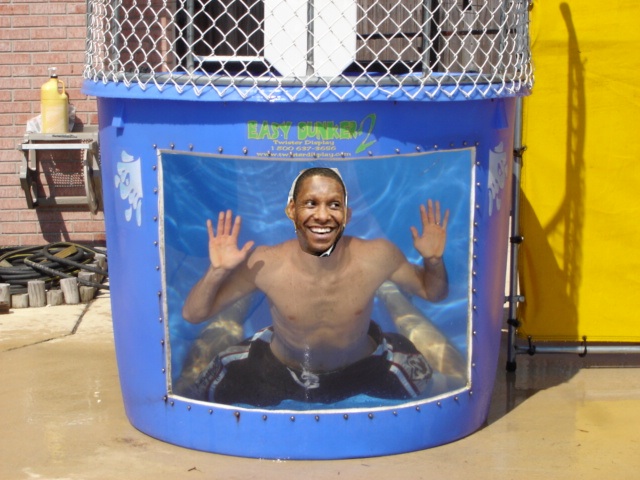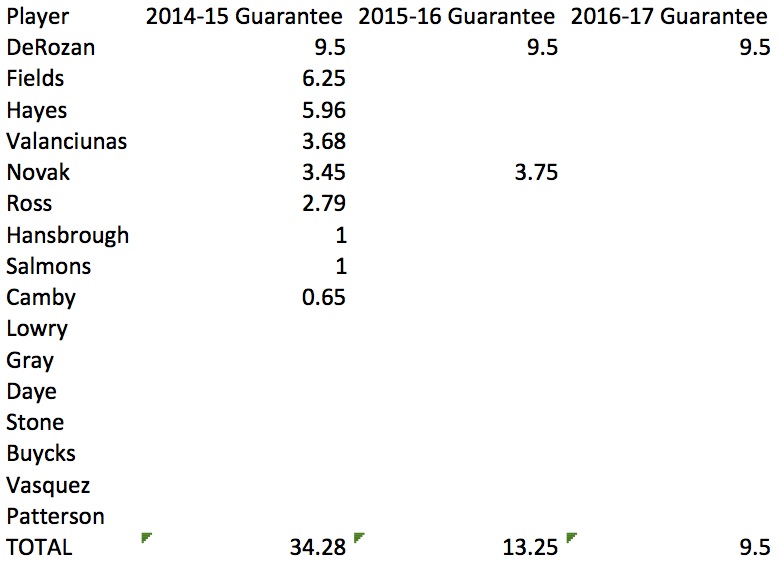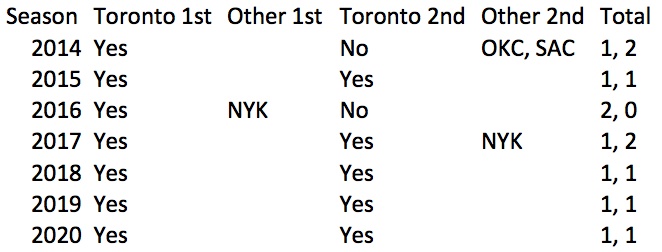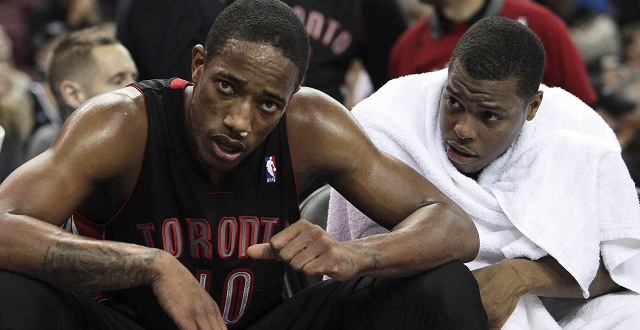The assumption has been that the Toronto Raptors are tanking this season.
That assumption is fair and based on both context clues and logic; the Raptors need to be bad to get good, and this is an especially attractive route in a year where Canadian Andrew Wiggins is available as a potential lottery prize. Industry insiders have hinted at the fact that the Raptors are in a tear-down mode, and the early part of the season has been spent waiting for the next domino and then the next domino to fall.
General manager Masai Ujiri has made two crucial steps towards setting a stronger foundation for the team: he’s gotten rid of two troublesome contracts and he’s acquired some future assets in the form of the picks acquired for Andrea Bargnani. Rudy Gay returned some useful pieces that actually have the team playing better (more on that next week), but that trade was about financial flexibility more than anything.
If you look at how teams are built, there are essentially three keys, none of which are mutually exclusive or necessary in combination: a star player, financial flexibility and tradeable assets. Ujiri has now successfully created financial flexibility moving forward and acquired some assets then in effect work as currency.
The asset acquisition isn’t quite as obvious, but during the window in which picks can be traded, the Raptors have an extra first and an extra second. That’s not significant, but it’s not insignificant either, especially if you consider those picks as currency and consider the Raptors own picks as moveable.
And the currency aspect of picks may be why we’ve heard so much about Ujiri seeking future firsts in any deal. Why is a 2018 first from the Knicks or a 2019 first from the Nets so important? Sure, maybe he’s got his eyes on Seventh Woods and knows he’s going to stay in college for a few years, but it’s more likely that he’s in asset acquisition mode, and something like taking on Raymond Felton’s contract and grocery bill is well worth a future pick, however impossible to value that may be.
Now, before I go forward, it’s worth being forthcoming with the fact that I’m generally not in favor of tanking, even though I absolutely understand the logic and even the necessity in the current NBA system. If I was a GM, I’m positive I’d do it too, not because I’m guaranteed anything (you’re not) but because it’s a system that’s there to be gamed and there’s a chance of expediting the rebuilding process in an appreciable way.
With all of that said, I’ve softened on the anti-tanking stance (“you can’t fight it, you might as well embrace it”, in the immortal words of Sum41). If it’s coming, I’ll fall in line, even though I’ll never, ever cheer for a loss in an individual game.
I’m taking a circuitous route to get to my point, which is:
I’m starting to feel like the Raptors aren’t actually in full-blown, everything-must-go tank mode.
While, as mentioned, I realize this is probably the ideal route for the Raptors, consider the following facts:
*The Eastern Conference is absolutely awful.
*The Toronto Raptors are actually not that bad.
*No individual Raptor is likely to net a great return.
Let’s start with the second point; the Raptors probably can’t tank. They’re 11-15, which isn’t great, but they have an almost-even point differential (15th in the NBA) against a schedule that’s actually been above-average in difficulty (11th), leaving them 14th in Basketball Reference’s Simple Rating, 12th in Hollinger’s Power Rankings and sitting with a 93.8 percent chance of making the playoffs based on ESPN’s Playoff Odds.
And that ties into the first point; If Ujiri strips the assets that do have value, this team might fall to ninth or 10th in the East, perhaps a bit lower, but they’re not bottoming out unless Ujiri and Dwane Casey get really shady. In a best case scenario, on the other hand, this team might have enough to make the second round of the playoffs. You wouldn’t call them a top-four team in the East on talent alone but it’s pretty easy to see the Raptors ending up with Washington or Charlotte in a four-five match-up and making a series of it. This sounds like nothing, but for a franchise with only one playoff series victory in 19 years, with new ownership and a new MLSE boss, and the not-insignificant lure of four-plus games of playoff revenue, a playoff push probably isn’t being discounted entirely in the office.
And then the third point, that no Raptor is bringing a tonne back. You might get a future first for Kyle Lowry if a team gets more desperate, and you’d almost certainly be able to fish a future first, perhaps with protections, for Amir Johnson. You could deal DeMar DeRozan, but it’s unclear if his salary is such that, while he’s valuable, anyone would give you much for him. Jonas Valanciunas is reportedly off the market unless a deal is a can’t-miss proposition. Nobody beyond those four is bringing back a first, and nobody else is going to move the needle on the tank-o-meter.
If you could deal Lowry, DeRozan and Johnson for two firsts somehow (separate deals, or in one giant multi-team deal), you probably do it, but you’re not dealing them for things that don’t move the needle long-term. Lowry, yes, you get what you can if you don’t want to pay him this offseason, but DeRozan and Johnson don’t need to go – there’s already cap flexibility, they’re good players, they’re young and they like playing here. You could have worse pieces to help transition from rebuilding to building.
So, let’s review: you’re not out-tanking the rest of the East, you’re not getting much for anyone except maybe Lowry and Johnson, there’s playoff potential and you’ve already built in some cap flexibility and acquired future assets.
It’s very possible that Ujiri has evaluated the situation and realized that there are more plausible paths to building at the moment. The Houston Rockets waited with flexibility, asset acquisition and opportunistic striking to turn into a near-contender. Maybe a Dwight Howard wouldn’t sign in Toronto, but maybe with flexibility and assets (young players and picks) you can continue to poach from teams, ala the James Harden deal. Phoenix is doing pretty damn good with a similar “just make net-positive deals” strategy right now, too.
So you continue on the current path, deal what you can for assets largely considered as “currency” (future firsts, young players on cheap deals), and even use some of your new-found flexibility to get a team to pay you to take on a bad deal (Utah got two firsts to take on Richard Jefferson and Andris Biedrins). You sit back, you continue to evaluate and acquire assets. You don’t make a trade that isn’t a net-positive just for the sake of tanking, because making a net-negative deal because it makes sense in a narrow vacuum is poor asset management. Just stay the path, and make the deals that make sense.
And then you Chris Webber Andrew Wiggins.
Maybe this isn’t likely, but I have a theory that this is Ujiri’s current strategy. Acquire assets, improve flexibility, make smart deals and let the chips fall where they may with the 2013-14 season. And then you take those assets you’ve acquired, you leverage that flexibility you’ve created, and you make a major offer for a pick that can net you Wiggins (if he’s the endgame, which he almost certainly is).
Chris Webber was acquired for Penny Hardaway and three first round picks. It’s certainly possible a team with a high pick this year would see value in multiple future picks in place of one pick in 2014, specifically if they’re not enamored with the option available where they select. Say Wiggins slides out of the top spot, and the Raptors can offer their No. 17 pick, the Knicks 2016 first and either the Raptors 2016 or 2018 first (or the Knicks 2018, if they cave on the Lowry deal), for the second or third pick. Maybe a player is thrown in as sweetener, or the Raptors take back a bad deal as well.
It might not seem likely right now, but teams are in different stages of building and might have different strategies for building and it’s not a certainty that every team is equally enamored with every draft prospect.
And yes, perhaps part of this thinking is my desire to soothe the cognitive dissonance associated with wanting the team to win while also knowing a high pick is the best long-term strategy for a team in the middle. But I also don’t think it’s at all unrealistic.
The Raptors almost can’t do an all-out tank at this point and the players that are trade pieces might not net the return you’d like. I think the prudent strategy, then, is to continue to make positive-value moves, let the season play out, and then utilize what you’ve done to take a strike at Wiggins (or whoever). If that fails, sure, you still don’t have a star, but you have flexibility, trade currency and some useful trade assets. If it works, you’ve got your players some playoff experience, (slightly) improved the overall profile of the franchise and have more pieces around your top pick.
I don’t have sources to confirm this thinking, but this is where I’m at presently. Tanking actually isn’t all that easy, so it may be time to find another path to a high pick.




